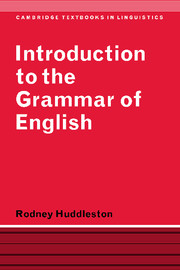Book contents
- Frontmatter
- Contents
- Preface
- Table of symbols and notational conventions
- 1 Basic concepts in grammar
- 2 The structural approach to linguistic analysis
- 3 The parts of speech
- 4 Verbs and verb phrases
- 5 The structure of kernel clauses
- 6 Nouns and noun phrases
- 7 Pronouns
- 8 Adjectives and adjective phrases
- 9 Verbs, nouns and adjectives: the boundaries between them
- 10 Adverbs, prepositions and conjunctions
- 11 Clause type
- 12 Coordination and subordination
- 13 Negation
- 14 Thematic systems of the clause
- References
- Index
- Frontmatter
- Contents
- Preface
- Table of symbols and notational conventions
- 1 Basic concepts in grammar
- 2 The structural approach to linguistic analysis
- 3 The parts of speech
- 4 Verbs and verb phrases
- 5 The structure of kernel clauses
- 6 Nouns and noun phrases
- 7 Pronouns
- 8 Adjectives and adjective phrases
- 9 Verbs, nouns and adjectives: the boundaries between them
- 10 Adverbs, prepositions and conjunctions
- 11 Clause type
- 12 Coordination and subordination
- 13 Negation
- 14 Thematic systems of the clause
- References
- Index
Summary
This book is written primarily for students of linguistics in universities and other tertiary institutions. It assumes no previous knowledge of linguistics: the first three chapters introduce the theoretical concepts and methodological principles needed to follow the later descriptive chapters. I have likewise made minimal assumptions about the reader's familiarity with ‘traditional grammar’ – all terms borrowed from the traditional repertoire, such as ‘noun’, ‘transitive verb’, ‘relative clause’, and so on, are fully explained. Although the book covers a fair amount of the grammar, it is not simply a short grammar of English, inasmuch as it devotes a good deal of attention to the problem of justifying the analysis proposed (where, for example, it differs from the traditional analysis) or of choosing between alternative analyses – it is in this sense that it is directed towards the student of linguistics. It does not, however, attempt to formalise the grammar: it is not ‘generative’ – and it is not written within the framework or model of any particular contemporary school of linguistics such as ‘transformational grammar’, ‘systemic grammar’, ‘functional grammar’ or the like. It follows, rather, a ‘structural’ approach, in a very broad understanding of that term, one where the grammatical categories postulated derive from a study of the combinational and contrastive relationships the words and other forms enter into. The aim is to give a reasonably careful and precise account of major areas of English grammar that will provide a foundation for more advanced work in theoretical linguistics.
- Type
- Chapter
- Information
- Introduction to the Grammar of English , pp. xi - xiiPublisher: Cambridge University PressPrint publication year: 1984

